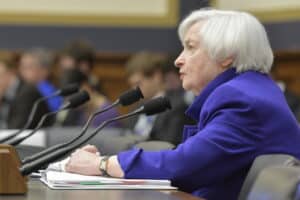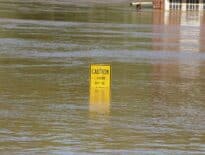
Treasury Secretary Janet Yellen testifies before Congress in 2016 during her tenure as Federal Reserve chair. Federal Reserve photo
Treasury Secretary Janet Yellen and Federal Reserve Chair Jerome Powell told Congress on Tuesday that more must be done to limit the economic damage from the coronavirus pandemic.
Powell also reiterated that he does not expect programs aimed at reviving the economy will trigger unwanted inflation.
Both officials struck upbeat notes about the U.S. economy’s outlook in their appearances Tuesday before the House Financial Services Committee. They said that, while there are encouraging signs of a rebound, it is important that government support continue in order to make sure the millions of people who have lost jobs can return to the labor market.
Several Republican lawmakers expressed worries that run-way inflation could be triggered by the more than $4 trillion in support provided by Congress last year, the Biden administration’s recently approved $1.9 trillion support package, coupled with the Fed’s ultra-low interest rates.
Addressing those concerns, Powell said that the Fed remains strongly committed to its two policies goals of achieving maximum employment and stable prices, which it interprets as price increases averaging 2 percent per year.
As progress is made against the virus and the economy opens, the Fed expects inflation will rise over the course of this year, he said.
“Our best view is that the effect on inflation will be neither particularly large or persistent,” Powell said. And as he has done in the past, he said that if inflation did start to increase in worrisome ways, the Fed had the tools necessary through its control of interest rates to keep it under control.
Republicans lawmakers pressed Yellen about reports the administration is preparing a new $3 trillion “Build Back Better” spending plan for infrastructure projects and improving education and job training. The measure would be partly financed by increasing taxes on the wealthy and corporations.
Yellen said that the administration is considering boosting the corporate tax rate from the current 21 percent to 28 percent. It was cut in the Trump administration from 35 percent as part of the 2017 tax bill.
“We have had a global race to the bottom in corporate taxation and we hope to put an end to that,” Yellen said.
Rep. Barry Loudermilk, R-Georgia, cited comments from critics that the administration’s relief package was more than six times larger than it needed to be. Yellen said that the country has lost 9.5 million jobs and if discouraged workers are counted, the jobless rate now would be over 9 percent.
“We have a huge problem of joblessness” that needs to be addressed, Yellen said.
The Tuesday hearing marked the first joint appearance by Powell and Yellen in their current jobs and it was Yellen’s first congressional appearance since taking over as Treasury secretary.
Yellen said the $1.9 trillion American Rescue Plan held out the prospect of returning the country to full employment next year.
“With the passage of the rescue plan, I am confident that people will reach the other side of this pandemic with the foundations of their lives intact,” Yellen said.
The economy fell into a deep recession a year ago with an initial loss of 22 million jobs, many of them in service industries such as restaurants and retail stores.
Powell acknowledged that a recovery is far from complete.
The Fed will “not lose sight of the millions of Americans who are still hurting, including lower wage workers in the services sector, African Americans, Hispanics and other minority groups that have been especially hard hit,” Powell said.
The Fed kept its benchmark interest rate at a record low of 0 percent to 0.25 percent at its meeting last week and even though it significantly boosted its economic forecast, it continued to signal that the benchmark rate would remain unchanged through 2023.
Under the March 2020 COVID-19 relief law, the Treasury secretary and Fed chairman are required to testify before Congress on a quarterly basis to provide updates. Powell and Yellen will appear Wednesday before the Senate Banking Committee.
Yellen on Tuesday pledged a rapid rollout from the Treasury of the new relief plan. She noted that within the first week after the legislation was signed into law, the Treasury and the IRS have distributed more than 90 million direct payments which provide $1,400 to qualifying individuals.
Yellen said since she took office two months ago, she has been focused on making sure that relief gets quickly to the areas of greatest need such as the “smallest small businesses, which are disproportionately owned by women and people of color.”
Yellen said the Paycheck Protection Program created by last year’s legislation often did not reach the smallest businesses. She said Treasury is working with the Small Business Administration to “tweak” how the program is implemented so that the loans, which the government forgives if businesses don’t lay off their workers, can reach millions more microbusinesses, especially those in rural and low-income areas.
The new relief package will also provide more than $30 billion to help renters and homeowners at risk of being evicted, Yellen said. She said the Trump administration had put in place rules that required tenants and landlords to provide a large amount of documentation to get rental assistance, documentation that the Biden administration is reducing.
“We’re cutting through the red tape for them, while still taking reasonable steps to prevent fraud and abuse,” Yellen said.






